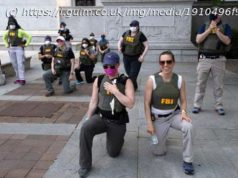A lack of blockbuster cases offers the justices a chance to bridge ideological divides that have flared in the confirmation process of Judge Brett M. Kavanaugh.
WASHINGTON — In the shadow of a titanic confirmation fight, the Supreme Court will return to the bench on Monday with a docket that offers an opportunity to lower the temperature.
Blockbuster cases on fiery social issues are missing from the calendar, at least for now. Instead, the justices will face lower-profile but still consequential legal questions that may allow them to find ways to bridge the usual ideological divides.
The justices have made similar attempts at unity in the past in reaction to fraught transitions on the court, like the one after the death of Justice Antonin Scalia in 2016. This time, the task has grown only more urgent as the bitterly partisan confirmation process for Judge Brett M. Kavanaugh, President Trump’s Supreme Court nominee, has been delayed so the F. B. I. can investigate sexual misconduct allegations.
“No matter how the current nomination of Judge Kavanaugh plays out,” said Jeffrey L. Fisher, a law professor at Stanford, “I suspect the court will be exceptionally eager to demonstrate how law is different from politics — that is, that it’s not a political body.”
“I expect many justices may make an extra effort to find common ground with unlikely allies,” he said. “The court’s legitimacy as an apolitical institution is going to be on the line to a greater degree, perhaps, than at any time in our lifetimes.”
But while the court’s low-key docket may help serve as a balm, the cases it will hear could ripple widely, posing threats to potential prosecutions of Mr. Trump’s associates and perhaps eventually to abortion rights. And big cases are in the pipeline, including ones on gerrymandering, gay rights and immigration.
The latest intrusion of politics into the Supreme Court is similar to one two years ago, when it started a new term with an empty seat after Senate Republicans refused to consider President Barack Obama’s nominee, Judge Merrick B. Garland, to replace Justice Scalia. The term that followed set a modern record for consensus.
That did not last long. Justice Neil M. Gorsuch, Mr. Trump’s first Supreme Court appointee, joined the court last year, and his first full term was marked by a series of sharply divided conservative victories on major issues like the president’s authority to restrict travel from abroad and whether government workers may be required to pay for the work of public unions.
Now, as the court faces another transition, it has again put together a quiet docket, said Kannon Shanmugam, a lawyer with Williams & Connolly. “This term is loaded with meat-and-potatoes cases, not blockbusters,” he said. “This will be a year for the case books, not the history books. At a volatile time, the court has filled its docket so far with nonvolatile cases.”
Still, the new term will provide important clues about where the court is headed. For instance, the justices have agreed to hear an unusually large number of appeals asking them to overturn precedents. The outcome of those cases could provide hints about the future of Roe v. Wade, the 1973 decision that established a constitutional right to abortion.
One precedent at risk concerns the Constitution’s double jeopardy clause, which forbids subsequent prosecutions for the same crimes. The Supreme Court has made one exception, saying that the federal government and the states are independent sovereigns, meaning that the same conduct can be prosecuted separately in state and federal courts.
In 2016, Justice Ruth Bader Ginsburg, joined by Justice Clarence Thomas, called for a fresh look at whether the exception makes sense. “The matter warrants attention in a future case in which a defendant faces successive prosecutions by parts of the whole U. S. A.,” she wrote.
The court will consider the question in Gamble v. United States, No. 17-646.
Its answer may have implications for the legal problems faced by associates of Mr. Trump. Should he pardon them for federal crimes, a Supreme Court ruling narrowing the definition of double jeopardy could complicate attempts by state prosecutors to pursue parallel charges.
The other precedents under attack concern whether lawsuits may be brought against state governments in the courts of other states, and procedures for suing in federal court over government’s use of eminent domain to take private property.
The Supreme Court will also consider whether the Constitution has anything to say about state civil forfeiture laws in Timbs v. Indiana, No. 17-1091. The case started when officials in Indiana, which has a law allowing the state to take property used to commit crimes, seized a $42,000 Land Rover from a former drug addict and small-time drug dealer named Tyson Timbs.
Mr. Timbs said the action violated the Eighth Amendment’s prohibition of excessive fines, but the Indiana Supreme Court ruled that the excessive fines clause does not apply to the states. The United States Supreme Court has said most parts of the Bill of Rights do apply to the states, but it has never squarely decided whether the excessive fines clause does.
The court will look at another fundamental constitutional question in Gundy v. United States, No. 17-6086. It arose from a part of a federal law that requires sex offenders to register with local authorities.
The law allowed the attorney general to decide how broadly to apply it to people who committed offenses before its enactment. The offender challenging the law, Herman Gundy, argued that Congress could not delegate that decision to the executive branch.
Should he prevail, the court’s decision could open the door to many other challenges, given that federal statutes frequently require executive branch officials and agencies to make judgments about how the statutes are to be applied.
Most of the current docket was assembled before Justice Kennedy announced his retirement in June. His absence may change the outcomes in some kinds of cases, notably in ones concerning the death penalty, where he occasionally joined the court’s liberals in narrowing the availability of capital punishment.
The court will hear arguments in one of those cases, Madison v. Alabama, No. 17-7505, on Tuesday. It concerns Vernon Madison, an Alabama inmate who suffers from dementia and cannot recall the crime that sent him to death row.
Justice Kennedy had voted with the majority in decisions that barred the execution of juvenile offenders and the intellectually disabled. Without his vote, it is not clear that the court will also forbid executing inmates who cannot remember their crimes.






